Tabith plans to ‘breathe new life’ into country’s football
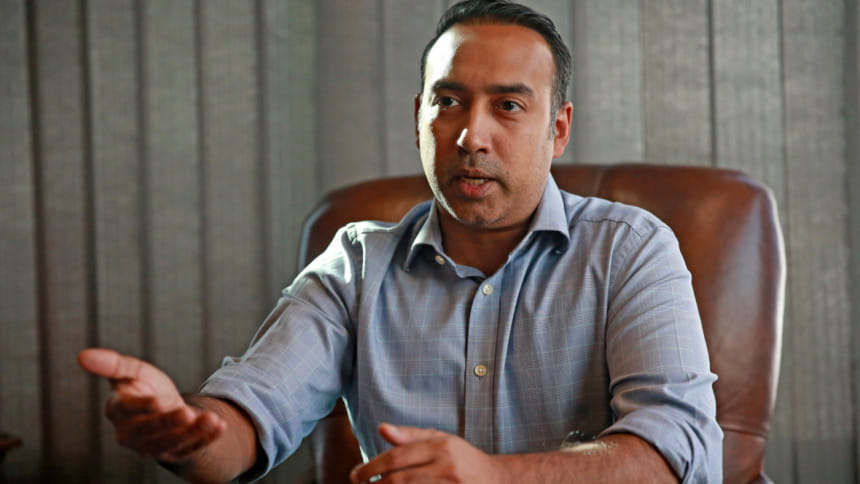
The newly elected president of the Bangladesh Football Federation (BFF), Tabith Awal, brings a wealth of experience to the role at 45, having served as BFF's vice-president twice before. In an exclusive interview with The Daily Star's Anisur Rahman, the seasoned politician, businessman, and former footballer shared his vision to elevate Bangladesh's footballing landscape and tackle the challenges ahead in his new leadership position.
The Daily Star (DS): What is your overall footballing philosophy?
Tabith Awal (TA): I don't see football either as entertainment or as a separate sport. I see football as part of my whole life, and I believe football should be part of the country's citizens.
DS: Your opinion on the present condition of the country's football?
TA: I see football in a good position to move forward… At the same time, football is evolving. The positive initiatives of the past may not help in the current context, and similarly, we won't follow up on negative things. If you look back at the ranking of teams, you can find big differences from one to four, but if you look at the ranking points, the teams are very close. In this perspective, Bangladesh have a good opportunity to progress in FIFA rankings.
DS: Since your name emerged as the BFF presidential candidate, there has been a common sentiment in the country's football fraternity: can Tabith Awal pull football forward? How do you take that sentiment?
TA: I think football is a state treasure, and I must succeed as I have taken on the responsibility of it. The question is, how can I succeed? If we can properly utilise the executive committee, the current crop of players, and the infrastructure, I believe we can breathe new life into the country's football.
DS: The Kazi Salahuddin-led board could not meet the expectations over the last 16 years, and you were also part of eight years of his tenure. What were his shortcomings, and why?
TA: We should not talk one-sided. While there were shortcomings, there were also gains. We saw the Argentina-Nigeria match in Bangladesh, the rise of licenced coaches in Bangladesh, the success of the women's team in the SAFF Championship, and the failure of the men's team in the SAFF Championship… However, if you want to know specifically where the weakest point of the past was, and where we want to place emphasis, I would say it is district-level football. It is now imperative to decentralise football.
DS: What will be your action plan to revive football?
TA: I want to ensure football reaches every corner of the country; there will be no single day when football is not played on the ground. Secondly, technical skills must somehow be instilled in players from tender ages, meaning from the eight-to-12-year-olds. Otherwise, we can't fulfil our ambition. Lastly, we must raise the standard of the national team to a very high level because fans feel football is suffering if the team lose.
DS: What are the things you want to achieve in the next four years?
TA: Actually, with the committees and ambitious plans we have designed for one year, we will be able to assess whether we can carry them forward in the following years. After four years… with the resources we have, Bangladesh [men's team] should progress by 70 places from the current position [of 185 in FIFA rankings]. In terms of infrastructure, whether through the BFF or the clubs, we should have four specific stadiums or complexes. Regarding the players, a significant number -- male and female -- should be playing at the international league level, not just the domestic level.
DS: The BFF, which has always faced financial crises, has further fallen into an image crisis, especially after FIFA disclosed its transparency scandal. How do you plan to recover from both issues, given that you also oversee the finance committee?
TA: Now the time has come to generate new sources of revenue, and we have some ideas… because football is no longer just watched in stadiums or on television. It is now being watched on different platforms like social media and streaming services. If we can generate revenue from these sectors, we can meet the financial demands needed to run football.
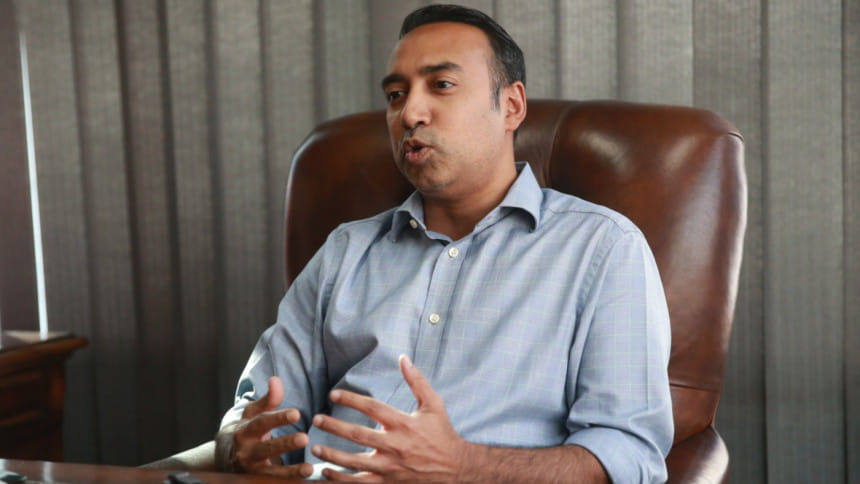
From the perspective of financial discipline in the BFF's accounts, while it is confidential, it is not an account of profit or loss, rather one of donors and expenses. If we can enhance the perception that the discipline meets expectations, I think it will be sufficient to restore trust.
DS: Your take on the strong whispers about commission business in the appointments of foreign coaches or technical directors in the past.
TA: People in Bangladesh speak without having any documents or meaningful data. The question is not whether anyone in Bangladesh is engaging in commission business. If you look at those who give away commissions, they are also breaching ethical standards at the international level. Are we prepared to raise fingers at them? Do you think any coach would sacrifice part of his remuneration? It doesn't make sense. I hope such whispers will diminish in the coming days, and I am preparing myself mentally so that they do not disturb me.
DS: What are your thoughts on the women's football team, who have virtually overshadowed the failures of their male counterparts? How do you plan to take them further?
TA: I don't differentiate between women's football and men's football. To me, they are all footballers, and when they take to the ground, they represent Bangladesh. When they score goals, the people of the country rejoice. However, we definitely have more opportunities to excel in women's football owing to having more resources. We are dominating South Asia with back-to-back titles, and we are happy about that, but it is time to elevate our women's football performance to the Asian level. Our vision is to make Bangladesh's women's team competitive at the Asian level and to add more girls to women's football because our pipeline is still weak.
DS: When the senior or junior women's football teams succeed at the international level, they receive financial incentives, but they struggle to survive due to the poor domestic structure. Do you have any plans to overcome the poor competition structure for women's footballers?
TA: When we started women's football some 10 years ago, we struggled to even form a playing eleven. But now, we are seeing more players outside the national team. If we plan to organise a league with 10 teams, we need at least 300 players, and we have almost reached that number. There are also investments from Bangladesh Army, BKSP, and a couple of private academies in women's football. If the women's football league continues, players will benefit from the clubs over the years, and the facilities will not be confined only to the national team. Our vision is for women to play football across the country and earn a living through it. We aim to move forward steadily with women's football.
DS: Soon after being elected president, you attended the AFC Award Night to know the views of the AFC and FIFA. What were your findings?
TA: FIFA and the AFC have clear views that 180-million-strong Bangladesh has a lot of talent… We have already received directives from FIFA, and based on those directives, we have immediately formed an independent new constitution reform committee, which has already started its work.
DS: Can you specify which areas of the BFF constitution you want to reform?
TA: To be honest, I don't know anything specific, but I am aware of the government's demands, our demands, and what FIFA wants. There is nothing specific yet, but there are three to four principles. Some standing committees are not suitable in terms of progressiveness and professionalism. The second issue is self-governance because there are no guidelines on who will investigate indiscipline, how it will be done, and what the punishment will be. So, self-governance is missing here. The third principle is to uphold different values of football.
DS: Do you feel Bangladesh needs to develop an identifiable playing style?
TA: We need to develop footballers tactically from the grassroots level, alongside technical growth. If we plan for the next four to eight years, we need to play a lot of possession football, considering our limitations in endurance and physicality. Additionally, we need specialised coaches in goalkeeping, free-kicks, and defending free-kicks.

 For all latest news, follow The Daily Star's Google News channel.
For all latest news, follow The Daily Star's Google News channel. 


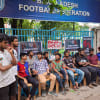

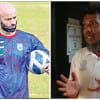


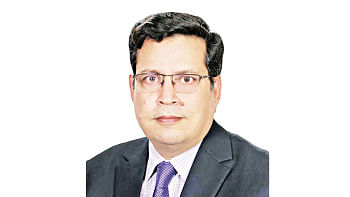
Comments